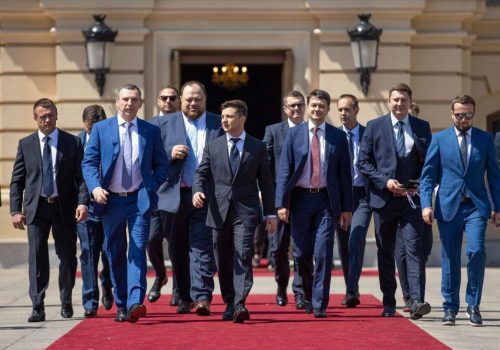A unique chance for change
The landslide victory of Servant of the People on July 21 offers great opportunities for reform in Ukraine, but such windows rarely last long. Ukrainians have voted against the old oligarchic system, not really in favor of the new politicians. It is vital to focus on what is most needed now and act fast.
More than two-thirds of the new MPs have never been in parliament before. Ukraine finally has a parliament no longer dominated by businessmen. This offers a unique chance to establish rule of law and break up the oligarchic system.
President Volodymyr Zelenskyy needs to start with the parliament itself. This is the time to abolish parliamentary immunity and rein in political financing. The real ownership of television channels should be made transparent as well.
Another step should be to establish some rule of law and property rights. The day after the elections, Zelenskyy issued a decree targeting corporate raiding by state law enforcement, which must be rooted out. First, the infamous Department K of the SBU that oversees corruption and organized crime needs to be abolished (reportedly 8,000 officers). Second, Prosecutor General Yuriy Lutsenko must be replaced and the whole prosecution reformed so that it works for and not against the rule of law. Third, judicial reform must be completed. If possible, the new Supreme Court judges, 44 of whom were appointed but didn’t meet the standards of an integrity test, should be disqualified. Fourth, the new anti-corruption court needs to be activated. Fifth, let new customs chief Max Nefyodov clean up customs.
Subscribe for the latest on Central Asia
Receive updates for events, news, and publications on Central Asia from the Atlantic Council.
In economic policy, all kinds of protected markets need to be broken up and privatization pursued. The best way of disciplining big businessmen is to open up all markets to both domestic and foreign competition. The EU Association Agreement and Ukraine’s acceptance of EU standards do much of the trick, but Ukraine needs to reform its antimonopoly policies to favor competition. Zelenskyy has rightly advocated the legalization of private sales of agricultural land. He should start immediately with pilot sales of state-owned agricultural land to raise the low land prices to a reasonable market level. To speed up privatization of most of the 3,500 state enterprises, the many small state companies should be auctioned off as fast as possible, while all the big, truly valuable state companies should embrace corporate governance with independent boards.
The great economic achievement of the last five years is macroeconomic stabilization. It needs to be maintained and completed. Ukraine is well advised to maintain a small budget deficit of about 2.5 percent of GDP and a strict monetary policy to bring inflation down to a few percent from 9 percent a year. Then, the independent NBU can gradually reduce interest rates. Ukraine needs to agree with the IMF on a three-year financing program to engender trust both at home and abroad. Then, the floating exchange rate of the hryvnia will rise; the public debt of currently 56 percent of GDP will decline toward 40 percent of GDP; the cost of Ukrainian debt will decline. This is necessary but not sufficient for economic growth.
For the last three years, Ukraine’s economy has grown by 2-3 percent a year, but it should grow by 7 percent a year given that Ukraine has gained access to the big European market. Ukraine needs to raise its investment ratio from 20 percent of GDP to 28-30 percent of GDP to grow that fast. The fundamental problem is that Ukrainians do not keep their savings in Ukraine or hryvnia but in US dollars or abroad. Foreigners see that and do not invest. The government needs to make attracting major foreign investment a matter of prestige. As higher economic growth takes hold, Ukraine can offer better support to its education and health care sectors, which are badly neglected.
Finally, the essence of state administration in Ukraine needs to change. In an old-fashioned Soviet manner, the Ukrainian state tends to regulate the details rather than the essence of matters. No document should require more than three signatures, while 20-30 signatures are frequently required now. The decentralization of state power is proceeding well and allows local communities to resolve their own problems.
Right now, Ukraine enjoys a unique chance. These elections show that the country is united against the old dysfunctional system. Years of public debate has given rise to a broad and sensible consensus around reforms. The question is no longer what to do but whether it will actually be done. This reform consensus together with the size of the victory and the lack of experienced politicians in the winning party are arguments for a technocratic government, bringing in the most skilled policymakers.
Anders Åslund is a senior fellow at the Atlantic Council and author of the new book “Russia’s Crony Capitalism: The Path from Market Economy to Kleptocracy.” Follow him on Twitter @anders_aslund
Image: Ukraine's President Volodymyr Zelenskyy reacts at his party's headquarters after the parliamentary elections in Kyiv, Ukraine July 21, 2019. REUTERS/Valentyn Ogirenko
